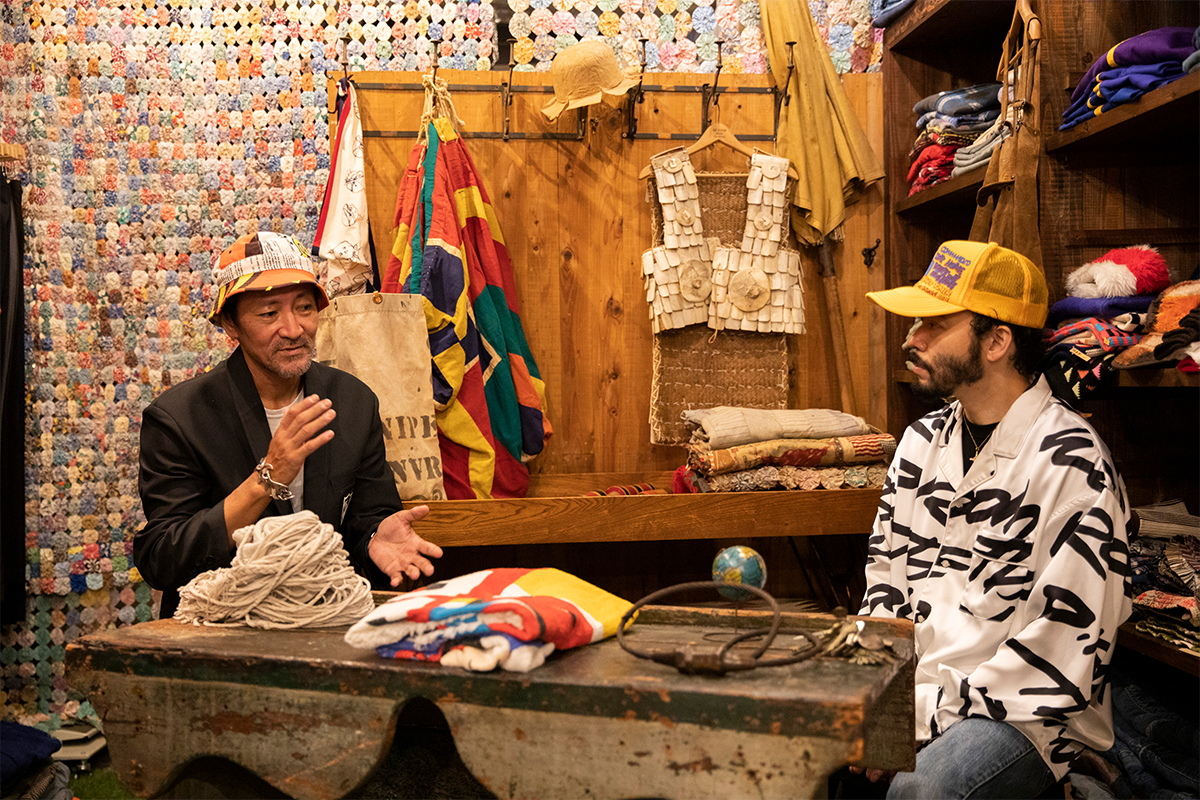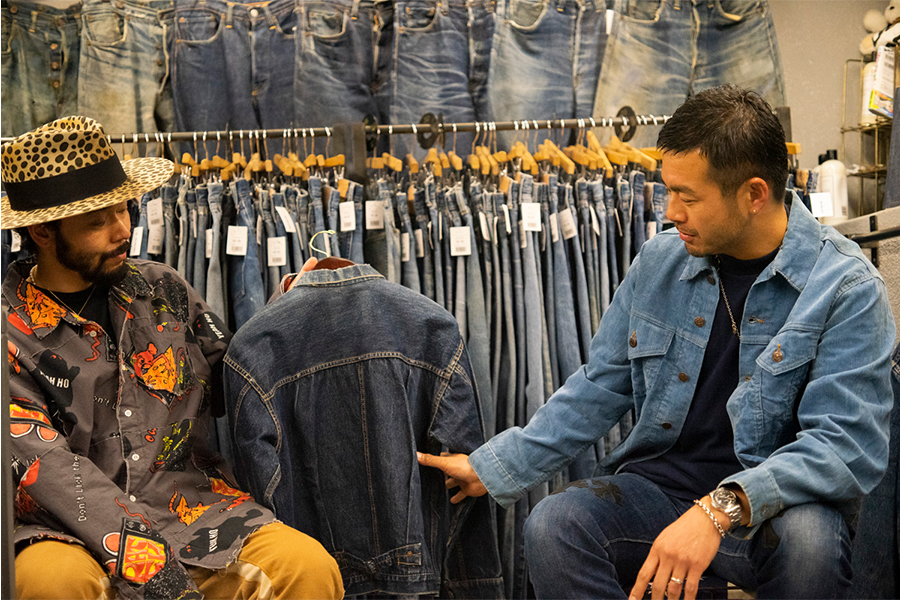TALKING ABOUT ARCHIVES Vol.30
New perspectives born from the archive (Part 1)
From high fashion to street brands, the fashion world these days is inseparable from the concept of the ‘archive’. The genre we call the archive isn’t limited to just fashion, but includes everything from everyday items to daily necessities. In this instalment, we bring you a dialogue between Motofumi “POGGY” Kogi and the owner of JANTIQUES, Hitoshi Uchida, located in Naka-Meguro; they sell not only second-hand clothes but also everything from furniture to everyday items. From this conversation, you will be able to further your understanding of the connection between fashion and the archive.
--- Firstly, POGGY, could you tell us what your general impression is of JANTIQUES?
POGGY: “I feel like a lot of the second-hand clothing stores in Japan used to be focused a lot on presenting their wares in categories based on the decade they originated from. Abroad, the presentation is done more freely, not to say that it’s loose or anything, more that it doesn’t really matter to them how they’re displayed, which I think is really cool. That style is pretty difficult to copy, but I think JANTIQUES is a store which has always gone with this method. The store itself is quite big, so it’s pretty easy to display a lot of items, but the items displayed are mixed really well, crossing over different eras. Some items on display are from the early 1900s, or even from the late 18th century, right?”
Uchida: “Yes, they’re few but we have some really old items.”
POGGY: “That being said, there’s also a lot of items on sale from the eighties and nineties, and the genres range from work clothing to ethnic items, from military to school uniforms, the variety is really amazing. It must require a lot of knowledge from many fields to be able to mix all of these well. Mr. Uchida, do you also do the displaying yourself?
Uchida: “Yes, everything aside from the women’s clothing I do by myself.”
POGGY: “That’s right, you have some women’s clothing as well. This kind of mixing is not something anyone can do. You have stores focused on American items or European vintage wear, but just looking at a single genre like dress shirts, you have American pieces by the Brooks Brothers lying next to English items by a store with a long history like Turnbull & Asser. There’s not a lot I can say from someone with my level of knowledge, but it feels like this store has a pretty good coverage of a lot of the things that are said to be important for a brand store these days, even things that aren’t that obvious, and even by just looking and feeling the clothes here I think I could learn a lot.”
--- Mr. Uchida, this mixed style that POGGY just mentioned, was that something you always aimed to express when you first started JANTIQUES?
Uchida: “Yes, that was always part of my plan.”

--- So when did JANTIQUES first open?
Uchida: “We opened in 2005, so about 15 years from now.”
POGGY: “Mr. Uchida, do you personally experience any difference between the feel of second-hand clothes stores in Japan and abroad?”
Uchida: “Let me see. Before, when I was working for Santa Monica (Harajuku), I would go to America and stay for about two months to buy new items. I would do that about two times a year, so about four months of a year I’d be living in America, and on my weekends, I would enjoy my free time walking outside, going to flee markets or malls selling antique wares. Doing so I started being interested in the daily life there; how are actual Americans living there lives here? There would even sometimes be people who would invite me saying ‘why don’t you come to my house today?’ almost like they’re displaying their wares. That was something I really enjoyed there. Inviting people to your house and drinking a cup of coffee, that was something I would like to do myself, and I started doing that after I moved house afterwards.”
--- I see! So at the core of the store’s concept, there was this idea of items laying around randomly, in a good way of course, almost like visiting someone’s home. Can you tell us about how that stance might’ve changed over the years?
Uchida: “I always felt like there was a limit to presenting clothing just as clothing, so I’d decided for this store I wanted to have it feel like a real home, where basically everything you see is for sale. Clothing was my specialty so I left that for later and instead started with other items like buttons and picture frames. That stance hasn’t really changed over the years. What has changed is that ever since the COVID-19 crisis started around April, I’ve started selling items online as well.”
--- I see, so up until now the only way to buy these items was at the storefront. Can you tell us something about your experience in selling items online?
Uchida: “Hmm.. I didn’t really like it at first because selling items by hand has been my way of business over the years, but after a while, just like selling at the store, I felt like I could see the customer’s face while selling even online, which is what motivated me to keep on going selling online as well.”

--- What do you mean by being able to see the customer’s face when selling items online?
Uchida: “For example, it could happen that after my free day I’d come to the store and an item had been sold and would be gone from the store. I’d call that ‘picking up fallen leaves’; these fallen leaves are what would lead me to imagine in what way the customer would’ve looked at the item, even when all they did is click a button on their PC. The size they picked is also a way of picking up those leaves. You can’t tell from a first-time customer, but I input most of the data myself, so when I display an item in the store, I imagine which of these people would buy this kind of item, which is the same using the internet. I’ve only been doing it for about half a year though.
--- I see. I can imagine there being a lot of points in common there. By the way, Mr. Uchida, how do you view current trends in fashion?
Uchida: “Hmm, that’s a difficult question.”
POGGY: “My blood-type is AB, so I can still keep on going for a while, but even I get tired sometimes. These days people handle fashion the same way they handle real estate, like for example with sneakers.”
--- Like investing in certain genres.
POGGY: “Vintage is a genre of fashion these days of itself, which is good and all, but you get tired of it if you keep on looking at the same things. But when I come to JANTIQUES, I feel like I can reset that feeling, to go back to the way clothing is supposed to be enjoyed. I think Mr. Uchida is able to keep that feeling alive because he is uninvolved with all that tiring stuff.”

Uchida: “That’s probably true. I don’t know if this is related to the question, but I feel that I want to choose for myself. I feel there’s a lot of people who can’t do that. They walk in, look around with this weird look on their face, and just walk out again. Last year, I opened another store in Gunma called Uchida Shoten. I used to have a storehouse here in Naka-Meguro, and I moved that to Gunma. It turns out the place I hired was way too big so I turned it into a store. I asked a furnisher to take all the items and shelves that were in the storehouse in Naka-Meguro and turn it into a kind of storehouse to show to other people. As an end result, there were actually quite a lot of people there who actively asked they wanted to see a certain something and climbed the ladders just to see it. Surprisingly, most of these people were quite young. That was not the original intent behind the store, but I feel that if I was able to share with these younger people the joy of choosing something for yourself by opening that store, it would be a great thing.”
--- Is it mostly locals coming to visit Uchida Shoten?
Uchida: “I think so. Last year obviously most customers came from other areas, but with the COVID-19 crisis here, most people are really locals. Some even come to the store by bicycle.”
--- That’s great! With social networks around these days, the way information spread has changed a lot while the information itself is still the same in value. Especially in places like this slightly away from the big city, young people can develop their own stance towards choosing the kind of things they like.
POGGY: “That’s definitely part of the appeal, yes. Just like Mr. Hosokawa from readymade, or in the music field you have WILYWNKA, you have people who have a countrywide influence even onto Tokyo while being in Osaka; in this case, being far away works in their favor. They’re kind of mysterious. There might be an interesting rapper in Okinawa or something, there definitely is a fertile ground for people to create precisely because they’re not in Tokyo. When in Tokyo, you end up sticking to the rules, adjusting to the frame that’s already here. Choosing for yourself is definitely an important thing. I learned a lot today again!”
Motofumi “POGGY” Kogi
Born in 1976. Started working part-time at UNITED ARROWS in 1997 and opened his own store, Liquor,woman&tears in 2006 after working for the press for a while. In 2010, he opened a new store called UNITED ARROWS & SONS, where he worked as director. In 2018 he went independent and is gathering attention for his various activities, like working as the fashion director for 2G, a store in the recently renewed Shibuya PARCO building.
Hitoshi Uchida
Born in Gunma Prefecture in 1969. Worked at Harajuku’s famous second-hand clothing store, Santa Monica, for eighteen years. After going independent for 2005, he opened JANTIQUE in Naka-Meguro selling items not limited to only second-hand clothes, preferring a style pulling from many different parts of the archive, and is known and loved for many people in the industry. In 2019, he opened his second store, JANTIQUE Uchida Shoten in his hometown, Takasaki City in Gunma Prefecture. Starting from March this year, he also started selling his items from JANTIQUE online as well.
Photo_ Shiga Shunsuke
Text_ Maruro Yamashita




